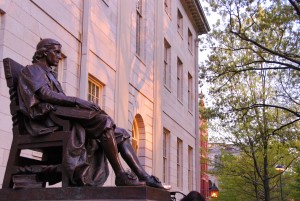
John Harvard statue, Harvard University campus, Boston, Massachusetts.
It’s fitting that today, May 6th–the final day of the HUD Energy Innovation Fund grant, which brought me to Boston two years ago to work with New Ecology, Inc.–is the day I close one chapter and officially enter a new one…
I’m incredibly excited and honored to officially accept a position with Harvard‘s Office for Sustainability‘s engagement team as sustainability manager of the Harvard Longwood Medical Campus!
The University has set forth ambitious goals for energy and water reduction among other things, but relative to many other areas of the University’s campus achieving these goals will be particularly challenging at the Longwood Medical Campus. The lab spaces, used for conducting research, have a disproportionately high energy use intensity ratio given the level of air exchanging, plug loads, and water requirements. Engaging with these lab spaces will be a significant portion of this position’s responsibility.
Additionally, I will have the opportunity to co-direct the activities of the Longwood Campus Green Team, participate on various committees to promote sustainability, education, well-being, and other program efforts, and develop a robust sustainability program to meet goals of HMS and HSPH.
On a personal level, I’m excited about the diversity of the position’s responsibilities and the breadth of the University’s Sustainability Plan. Though I’ll report directly to the Office for Sustainability, the position basically has a client-relationship with HMS and HSPH. One day I may be performing a waste audit with rubber gloves, the next a walk-through with researchers in their lab spaces in a white coat, and then meet with a Dean from the HMS in a suit.
The Harvard Sustainability Plan encompasses not just energy and resource reduction goals, but is progressive and holistic in its approach towards sustainability. In addition to energy and emissions, the plan includes campus operations, nature and ecosystems, health and well-being, and organizational culture and learning.
While some may assume an institution like Harvard is isolated in an Ivory Tower, the University understands that it is integrated with the communities it exists within and around. They also see the process as iterative and have developed (and continuously develop) feedback loops to expand learning and measure outcomes. I also see resiliency as being increasingly important for the community, a conversation I’ve been a part of since prior to Hurricane Sandy and see as extremely important as we work and live within the new paradigm of anthropogenic climate change.

By
Adam Meier
Related






Congrats Adam! You are blazing new trails that will leave guys like me extolling their virtue in my classrooms. All the best for your continued success!